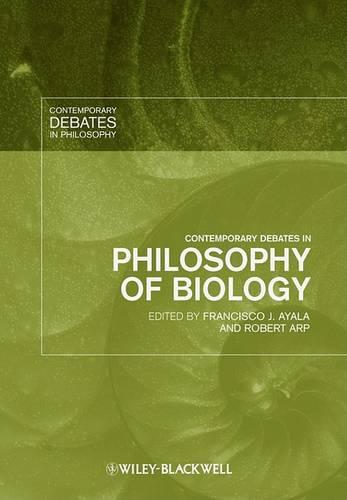Full Product Details
Author: Francisco J. Ayala (University of California, Irvine, USA) ,
Robert Arp (Independent Researcher)
Publisher: John Wiley and Sons Ltd
Imprint: Wiley-Blackwell
Dimensions:
Width: 17.80cm
, Height: 2.80cm
, Length: 25.40cm
Weight: 0.916kg
ISBN: 9781405159982
ISBN 10: 1405159987
Pages: 440
Publication Date: 13 November 2009
Audience:
Professional and scholarly
,
Professional & Vocational
Format: Hardback
Publisher's Status: Active
Availability: Out of stock

The supplier is temporarily out of stock of this item. It will be ordered for you on backorder and shipped when it becomes available.
Reviews
All chapters (including the very interesting contributions on the species problem by Claridge and Mishler, as well as the stimulating papers on evolutionary ethics by Ruse and Ayala) serve as an excellent introduction to the most hotly debated topics in the philosophy of biology today. (Metascience, 2011) Highly recommended. Lower-division undergraduates and above . (Choice, 1 November 2010) Contemporary Debates in Philosophy of Biology A very fine contribution to the pedagogical literature on philosophy of biology. The editors are to be congratulated for the thoughtfulness that went into producing this text. May it gain the wide acceptance it deserves. (Science & Education, March 2010) is an engaging anthology with many interesting contributions. The strength of the book is the format: two eminent representatives of the biophilosophical community have their say on a pivotal biophilosophical issue. ( Metapsychology, May 2010)
“All chapters (including the very interesting contributions on the species problem by Claridge and Mishler, as well as the stimulating papers on evolutionary ethics by Ruse and Ayala) serve as an excellent introduction to the most hotly debated topics in the philosophy of biology today.” (Metascience, 2011) ""Highly recommended. Lower-division undergraduates and above"". (Choice, 1 November 2010) Contemporary Debates in Philosophy of Biology ""A very fine contribution to the pedagogical literature on philosophy of biology. The editors are to be congratulated for the thoughtfulness that went into producing this text. May it gain the wide acceptance it deserves."" (Science & Education, March 2010) is an engaging anthology with many interesting contributions. The strength of the book is the format: two eminent representatives of the biophilosophical community have their say on a pivotal biophilosophical issue.” (Metapsychology, May 2010)
“Contemporary Debates in Philosophy of Biology is an engaging anthology with many interesting contributions. The strength of the book is the format: two eminent representatives of the biophilosophical community have their say on a pivotal biophilosophical issue. (Metapsychology, May 2010) A very fine contribution to the pedagogical literature on philosophy of biology. The editors are to be congratulated for the thoughtfulness that went into producing this text. May it gain the wide acceptance it deserves. (Science & Education, March 2010)
" “All chapters (including the very interesting contributions on the species problem by Claridge and Mishler, as well as the stimulating papers on evolutionary ethics by Ruse and Ayala) serve as an excellent introduction to the most hotly debated topics in the philosophy of biology today.” (Metascience, 2011) ""Highly recommended. Lower-division undergraduates and above"". (Choice, 1 November 2010) Contemporary Debates in Philosophy of Biology ""A very fine contribution to the pedagogical literature on philosophy of biology. The editors are to be congratulated for the thoughtfulness that went into producing this text. May it gain the wide acceptance it deserves."" (Science & Education, March 2010) is an engaging anthology with many interesting contributions. The strength of the book is the format: two eminent representatives of the biophilosophical community have their say on a pivotal biophilosophical issue.” (Metapsychology, May 2010)"
Author Information
Francisco J. Ayala is Donald Bren Professor of Biological Sciences at the University of California, Irvine, USA. He is a member of the U.S. National Academy of Sciences, the American Academy of Arts and Sciences, and the American Philosophical Society. In 2001, he received the National Medal of Science. Ayala has published more than 950 articles and is the author or editor of 31 books. He has been named the Renaissance Man of Evolutionary Biology by The New York Times. Robert Arp is an analyst at The Analysis Group, LLC who has interests in philosophy of biology and ontology in the informatics sense. He is the author of Scenario Visualization: An Evolutionary Account of Creative Problem Solving (2008), and co-editor of Philosophy of Biology: An Anthology (Blackwell, 2009).




